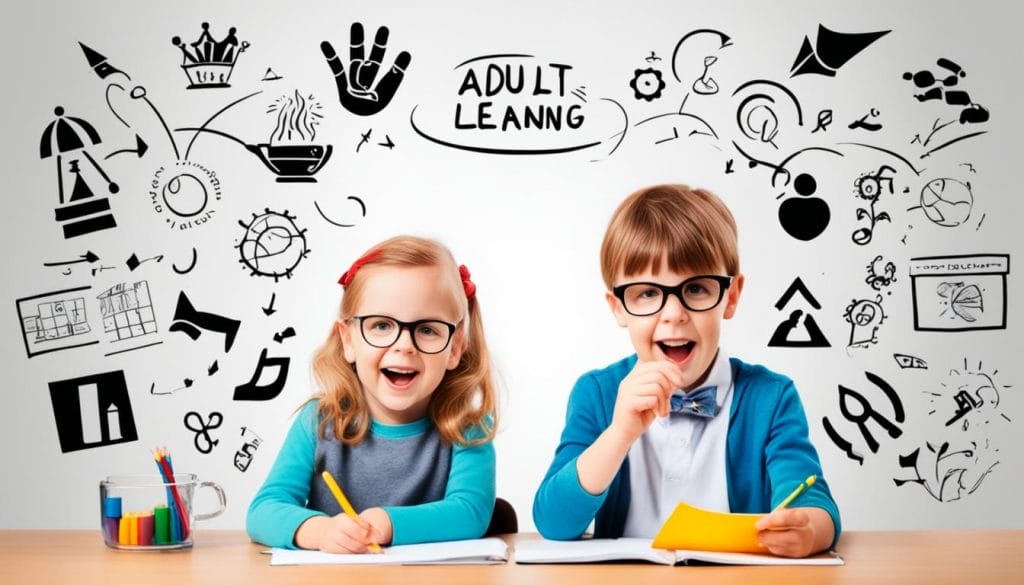Did you know that adults approach learning differently than children? In fact, a staggering 76% of adults in the United States engage in some form of continuing education or professional development throughout their lives. This statistic highlights the immense importance of understanding adult learning theory in order to design effective and engaging learning experiences for adult learners.
Adult Learning Theory, also known as andragogy, is a concept developed by Malcolm Knowles in 1968 that recognizes the unique characteristics, experiences, and motivations of adult learners. By understanding the principles of adult learning and leveraging adult learning styles, educators and trainers can create tailored and impactful learning programs that meet the diverse needs of adult learners.
Key Takeaways:
- Adult Learning Theory, or andragogy, focuses on how adults learn differently from children.
- Understanding adult learning theory is crucial for designing effective learning experiences for adult learners.
- Adults have unique characteristics, such as self-directed learning and the ability to draw on prior experiences.
- Andragogy emphasizes the importance of motivation, relevance, and practicality in adult learning.
- By applying adult learning principles, educators can create engaging and impactful learning programs for adult learners.
Overview of Adult Learning Theory
Adult Learning Theory is a framework that focuses on the unique ways in which adults learn and respond to educational experiences. It takes into account the characteristics and preferences of adult learners, guiding the design of effective learning programs tailored to their needs.
One of the key principles of adult learning theory is the shift towards self-directed learning. Unlike children, adults are motivated to learn when they have a personal interest or when the learning is relevant to their work or life experiences. They prefer practical and problem-centered learning that allows them to apply their knowledge in real-world situations. Additionally, adults bring a wealth of prior experiences that can be utilized as a valuable resource for learning.
By understanding the principles of adult learning theory and the unique characteristics of adult learners, educators can create engaging and meaningful learning experiences. This involves providing opportunities for self-directed and experiential learning, as well as incorporating practical and relevant content. By doing so, educators can empower adult learners to take ownership of their learning journey and enhance their overall learning outcomes.
Andragogy vs. Pedagogy

Understanding the Difference
When it comes to teaching and learning, two key approaches are often discussed: andragogy and pedagogy. While pedagogy focuses on teaching methods for children, andragogy is concerned with teaching methods for adults. The main distinction between the two lies in the assumptions made about learners and their learning process.
Andragogy, often associated with adult learning, recognizes that adult learners have unique characteristics and motivations. It places emphasis on self-directed learning, building on prior experiences, readiness to learn, relevance to everyday life, and intrinsic motivation. In contrast, pedagogy predominantly revolves around instructing and guiding children, incorporating structured and teacher-directed approaches.
Key Principles of Andragogy
Andragogy is guided by several key principles that inform effective teaching methods for adult learners. Understanding these principles is crucial for educators to design engaging and impactful learning experiences. The key principles of andragogy include:
- Creating a cooperative learning climate that encourages collaboration and active participation.
- Assessing learner needs and interests to better tailor the learning experience.
- Developing learning objectives based on learner needs to ensure relevance and applicability.
- Designing sequential activities that build on prior knowledge and experiences, facilitating a meaningful learning process.
- Working collaboratively with learners to select appropriate methods and resources that align with their learning preferences.
- Evaluating the learning experience to identify areas of improvement and measure learning outcomes.
By applying these principles, educators can create a conducive learning environment that fosters active engagement, promotes personal growth, and enables adults to apply their knowledge and skills effectively.
An effective understanding of the difference between andragogy and pedagogy is vital for educators who work with adult learners. By recognizing the unique characteristics and motivations of adult learners and incorporating the principles of andragogy into their teaching methods, educators can create impactful learning experiences that cater to the specific needs and preferences of adult learners.
Malcolm Knowles and the Principles of Adult Learning
Background and Contributions
Malcolm Knowles, an influential American educator, made significant contributions to the field of adult learning. He is best known for developing the concept of andragogy, which focuses on understanding how adults learn and designing effective learning experiences for them. Knowles believed that adult learners have distinct characteristics and motivations that set them apart from children. His work challenged the dominant pedagogical approach and emphasized the importance of self-directed and experiential learning methods.
Knowles’ groundbreaking research and insights into adult learning theory have shaped the field of education. His principles of adult learning provide a framework for designing effective learning experiences for adult learners. These principles include creating a cooperative learning climate, assessing the specific needs and interests of learners, developing learning objectives based on these needs, designing sequential activities, working collaboratively with learners to select appropriate methods and resources, and evaluating the learning experience.
Knowles’ work revolutionized the field of adult learning and continues to influence educational practices today. His emphasis on learner-centered approaches and the application of his principles have improved the effectiveness of adult education programs and professional development courses.
Application of Knowles’ Principles in Education
The principles proposed by Malcolm Knowles have had a significant impact on the field of education, particularly in adult learning contexts. These principles provide educators with practical guidelines to create engaging and meaningful learning experiences for adult learners.
By utilizing Knowles’ principles, educators can:
- Establish a cooperative learning climate that fosters collaboration and mutual respect among learners.
- Conduct thorough assessments of learner needs and interests to tailor learning experiences accordingly.
- Develop clear and relevant learning objectives that align with the specific needs of adult learners.
- Design sequential activities that allow learners to build upon their prior knowledge and experiences.
- Work collaboratively with learners to select appropriate methods and resources that enhance the learning process.
- Evaluate the learning experience to identify areas of success and areas for improvement.
By applying Knowles’ principles in teaching adults, educators can create an inclusive and engaging learning environment that promotes active participation, encourages self-directed learning, and enhances the overall learning experience. These principles ensure that adult learners have the opportunity to acquire knowledge and skills that are directly applicable to their personal and professional lives.
Transformative Learning Theory

Transformative Learning Theory, introduced by Jack Mezirow, is a powerful concept that focuses on learning that goes beyond acquiring knowledge and skills. It is a process that leads to a profound shift in perspective and a change in the way individuals think about themselves and the world around them.
At the heart of transformative learning is the idea that learning is not just about accumulating information, but about engaging in reflective discourse, challenging assumptions, and encouraging critical reflection. It is a process that challenges individuals to question their beliefs, assumptions, and values, and to reevaluate their understanding of the world.
This type of learning is particularly important for adults as it allows them to break free from old patterns of thinking and open themselves up to new possibilities. Through transformative learning, adults have the opportunity to develop new insights, gain a broader understanding of complex issues, and make positive changes in their lives and communities.
The importance of transformation in adult learning cannot be overstated. It is through transformation that adults can break free from limiting beliefs, expand their horizons, and unlock their full potential. Transformative learning enables adults to develop a more holistic and integrated view of the world, enhancing their ability to navigate the complexities of life and work.
The benefits of transformative learning are numerous. It can lead to personal growth, increased self-awareness, improved critical thinking skills, enhanced problem-solving abilities, and increased empathy and understanding of others. In addition, transformative learning can have a ripple effect, inspiring individuals to become agents of change in their communities and advocate for social justice and equity.
Transformative learning is a profound and essential aspect of adult education. It empowers individuals to challenge the status quo, question assumptions, and actively engage in the process of learning and growth. By embracing transformative learning, adults can embark on a transformative journey that opens up new possibilities and enhances their overall well-being and fulfillment.
Experiential Learning Theory
Experiential Learning Theory, developed by David Kolb, emphasizes the importance of learning through experience. This theory recognizes that individuals acquire knowledge and skills by actively engaging with the world around them. According to Kolb, learning involves a four-stage cycle: concrete experience, reflective observation, abstract conceptualization, and active experimentation.
The experiential learning cycle begins with a concrete experience, where learners directly engage in hands-on activities, encounter real-world situations, and gain firsthand experience. Following the experience, learners engage in reflective observation, where they reflect on their experiences, analyze the outcomes, and identify patterns and connections.
After reflection, learners move to the stage of abstract conceptualization. In this stage, learners use their observations and reflections to develop abstract concepts and theories, make connections to existing knowledge, and understand the underlying principles or frameworks. The final stage is active experimentation, where learners apply their conceptual understanding by testing their ideas, implementing solutions, and applying their learning in practical and meaningful ways.
David Kolb’s Experiential Learning Cycle
The experiential learning cycle, as illustrated by David Kolb, is depicted below:
Applying Experiential Learning in Adult Education
Experiential learning has proven to be an effective approach in adult education. By incorporating experiential learning methods, educators empower adult learners to draw on their prior experiences, make connections to real-world situations, and apply their knowledge and skills in practical contexts.
Adult education programs can apply experiential learning by integrating hands-on activities, case studies, simulations, and real-world projects. These approaches encourage active engagement, critical thinking, problem-solving, and reflection, enhancing adult learners’ understanding and retention of new information.
Furthermore, experiential learning provides a dynamic learning environment where adult learners can collaborate, share experiences, and learn from one another’s perspectives. This collaborative approach fosters a sense of community and enhances the overall learning experience.
By applying experiential learning in adult education, educators can create meaningful and impactful learning experiences, enabling adult learners to develop practical skills, deepen their understanding, and transfer their learning into real-life situations.
Social Learning Theory in Adult Education
Social Learning Theory, developed by Albert Bandura, focuses on learning through observation and imitation. Bandura believed that individuals learn by observing others and modeling their behavior. This theory is particularly relevant in adult education as adults often learn through interactions with others in various social contexts, such as work, community, and online networks.
Bandura’s contributions to social learning theory have highlighted the importance of modeling, reinforcement, and self-efficacy in the learning process. By observing others, adults acquire knowledge, skills, and attitudes that can be applied to their own lives and situations. Learning through observation allows adults to see real-world examples and gain practical insights, promoting more effective learning outcomes.
To foster social learning in adult learners, educators can create collaborative learning environments that encourage group discussions and interactions. Providing opportunities for mentorship and peer learning can enhance the social aspect of learning, allowing adults to learn from one another’s experiences and perspectives.
“The mere fact that people observe the behavior of others and the consequences of that behavior can significantly influence their own behavior.” – Albert Bandura
Additionally, incorporating real-world examples and case studies into the learning experience can demonstrate the practical application of knowledge and skills, making the learning process more engaging and meaningful for adult learners. By embracing social learning, educators can enhance the effectiveness of adult education programs and promote lifelong learning.
| Benefits of Social Learning in Adult Education |
|---|
| 1. Enhanced engagement and motivation |
| 2. Acquisition of real-world knowledge and skills |
| 3. Broadening perspectives through interactions with diverse individuals |
| 4. Application of learned concepts in practical situations |
| 5. Promotion of critical thinking and problem-solving abilities |
Self-Directed Learning
Characteristics of Self-Directed Learners
Self-directed learning is a critical aspect of adult learning, empowering individuals to take control of their own learning process. Self-directed learners exhibit certain key characteristics that differentiate them from other learners:
- They are highly motivated to learn and take initiative in seeking out knowledge and skills.
- They are independent, taking ownership of their learning goals and actively identifying their learning needs.
- They are proactive in determining the best strategies and resources to achieve their learning goals.
These characteristics make self-directed learners self-reliant and capable of driving their own learning experiences.
Promoting Self-Directed Learning in Adults
Facilitating self-directed learning in adults requires creating an environment that nurtures and supports their autonomy. Educators and trainers can employ several strategies to promote self-directed learning:
- Provide opportunities for choice and autonomy in learning activities.
- Foster intrinsic motivation by connecting learning to personal interests and goals.
- Offer guidance and support when needed, balancing independence with appropriate levels of assistance.
- Encourage reflection and self-evaluation to enhance self-awareness and self-regulation.
Additionally, incorporating technology, online resources, and personalized learning approaches can empower adult learners to become more self-directed in their learning journeys. By promoting self-directed learning, educators can optimize the learning experience and enhance the effectiveness of adult education.
Challenges of Adult Learning

Cognitive Overload and Adult Learners
One of the challenges that adult learners often face is cognitive overload. Cognitive overload occurs when learners are overwhelmed with excessive information and tasks, which can make it difficult for them to process and retain the information effectively. Adults lead busy lives, juggling multiple responsibilities such as work, family, and personal commitments. This can make it challenging for them to focus on learning and absorb new information.
Cognitive overload can negatively impact adult learners’ ability to concentrate, comprehend, and apply what they have learned. It can also hinder their motivation and confidence in their learning abilities. To address this challenge, educators need to implement strategies that help adult learners manage cognitive load and optimize their learning experience.
Addressing Challenges in Adult Learning Programs
There are several strategies that can be employed to address the challenges of cognitive overload and create a conducive learning environment for adult learners:
- Chunking information into smaller, manageable units: Breaking down complex concepts and information into smaller chunks can make it easier for adult learners to process and retain the information. This can be done through clear and concise instructional materials and organizing content in a logical and sequential manner.
- Providing clear and concise instructions: Clear and concise instructions help adult learners understand what is expected of them, reducing confusion and cognitive load. Providing step-by-step guidance and using visual aids and examples can make instructions more accessible and easier to follow.
- Allowing for spaced repetition and reflection: Adult learners benefit from spaced repetition and reflection, as it helps reinforce learning and commit information to long-term memory. Providing opportunities for learners to review and reflect on what they have learned at regular intervals can optimize their learning experience.
- Offering support and guidance: Adult learners may require additional support and guidance to navigate through the learning process. Providing mentoring, coaching, and access to resources and support networks can help them overcome challenges and persist in their learning journey.
- Creating a supportive and inclusive learning environment: A supportive and inclusive learning environment promotes engagement, motivation, and a sense of belonging for adult learners. Encouraging collaboration, incorporating diverse perspectives, and fostering a positive and respectful learning culture can contribute to a more enriching and effective learning experience for adult learners.
By addressing the challenges of cognitive overload and implementing strategies that cater to the specific needs of adult learners, adult learning programs can optimize learning outcomes and support the success and growth of adult learners.
Lifelong Learning
Importance of Lifelong Learning
Lifelong Learning is a continuous process that involves acquiring knowledge, developing skills, and honing competencies throughout one’s life. It is not limited to formal education but extends to personal and professional growth, adaptation to new challenges and technologies, and active participation in society. Lifelong learning enables individuals to expand their horizons, stay relevant in a rapidly evolving world, and embrace new opportunities.
One of the key benefits of lifelong learning is the opportunity for self-development. It allows individuals to explore new interests and passions, fostering personal growth and fulfillment. Lifelong learners tend to have a broader perspective, enhanced critical thinking skills, and an openness to new ideas and experiences. Moreover, lifelong learning supports professional success by equipping individuals with the knowledge and skills needed to excel in their careers and adapt to changing workplace dynamics.
Creating a Culture of Lifelong Learning in Adults
Creating a culture of lifelong learning starts by fostering a growth mindset, promoting curiosity, and cultivating a love for learning. This involves celebrating mistakes as opportunities for growth and encouraging individuals to embrace challenges and seek out new knowledge and experiences.
Opportunities for continued education and professional development are crucial for cultivating lifelong learning. Employers can support this by providing learning opportunities, such as workshops, conferences, and online courses that align with employees’ interests and career aspirations. Educators can design learning experiences that promote self-directed learning, critical thinking, problem-solving, and collaboration.
Recognizing and valuing the diverse talents and experiences of individuals is essential in creating an inclusive culture of lifelong learning. By acknowledging and leveraging the unique perspectives and skills individuals bring, organizations and communities can foster an environment that encourages continuous learning and growth.
In conclusion, lifelong learning is vital for personal and professional development. By creating a culture that values and supports lifelong learning, we can empower individuals to embrace new knowledge, adapt to change, and contribute meaningfully to their communities.





